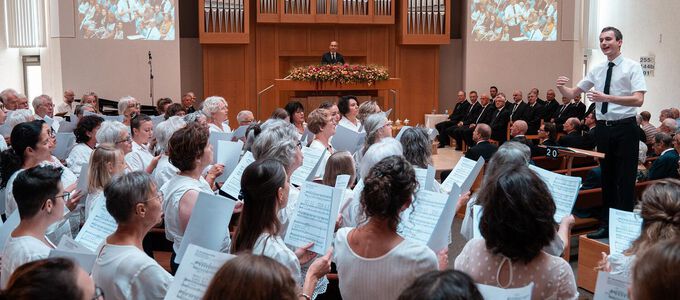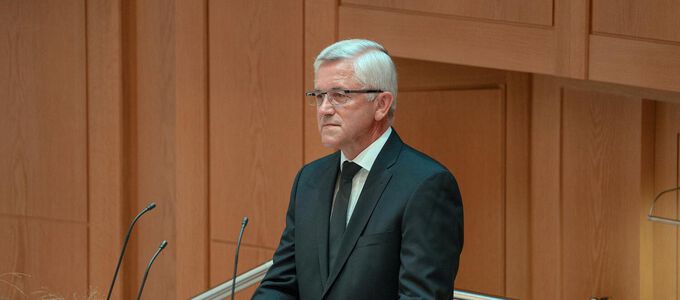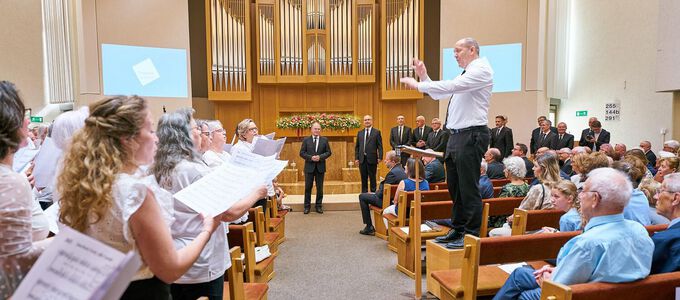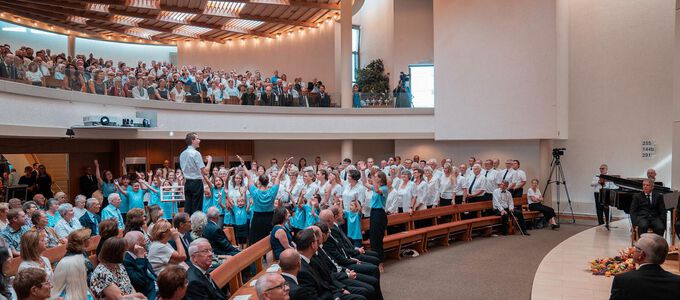
Gratitude says something about our relationship with God. This is something that Chief Apostle Jean-Luc Schneider made clear on Thanksgiving Day in Switzerland. The believers learned how one can show gratitude to God.
“And whatever you do in word or deed, do all in the name of the Lord Jesus, giving thanks to God the Father through Him.” This passage from Colossians 3: 17 served as the foundation for the divine service on 17 September 2023 in Ostermundigen, Switzerland. “This is a question of our relationship with God,” the Chief Apostle explained. “Our gratitude or ingratitude is an indicator of our relationship with God.”
When our relationship with God is not in order
Chief Apostle Schneider mentioned a number of examples from the Bible in which people were ungrateful and dissatisfied. “You can tell that their relationship with God was not in order,” he said. For example, Adam and Eve, who were discontent and wanted more. “They did not recognise the grace that God had granted them.”
He also mentioned the ten lepers, only one of whom felt the need to come back and thank Jesus after He had healed them all. Presumably these people thought that they had a right to a healthy, normal life, and that God had made a mistake. So why be grateful that a perceived injustice had merely been remedied?
An intact relationship with God
“Let us be thankful,” said the Chief Apostle. “Our relationship with God is in order, after all.” The Chief Apostle went on to list some of the many things God gives His children even though they have done nothing to deserve it: “Anything that has to do with the creation comes from God. Our lives, our health, our family, all of this comes from God,” the Chief Apostle listed.
“Through the sacrifice of Jesus Christ we have been given the opportunity to be liberated from the power of sin, from the dominion of evil! This is a powerful act of God!” The Chief Apostle went on to emphasise: “God has proven His love for us through the sacrificial death of His Son.”
“We can also be thankful that God responds to our prayers,” he said. “This is an act of God’s grace. God is never obliged to react to our prayers.” Furthermore, he explained that God grants us His salvation out of pure grace. Eternal fellowship with God is not a given.
Thank you, God
The Chief Apostle then gave the believers a number of helpful tips on how to express their gratitude to God:
- through prayer: “Every time we pray, we give thanks to God.”
- by bringing our offerings: “This is not only to say thank-you, but also to profess our dependency on God.”
- in Holy Communion. “We celebrate Holy Communion together—which is another way of expressing our gratitude.”
- by appreciating the gifts of God: “We must also make appropriate use these gifts,” said the Chief Apostle in reference to the earthly gifts we have been given. He went on to add: “Let us also appreciate grace and forgiveness, in awareness of what Jesus paid so that our sins can be forgiven.—We are aware of the value of the divine service, and make appropriate use of it. We are aware of the value of fellowship and make appropriate use of it as well.”
- by speaking and acting in the name of the Lord Jesus. “To speak in the name of Jesus Christ means that we must allow Him to come to expression again and again whenever we speak or even write.”
… do all in the name of the Lord Jesus
The Chief Apostle expanded even further on the last point: “Here Paul goes on to say, ‘Let your speech always be with grace, seasoned with salt.’ With these words, Paul makes reference to Jesus, who advised, ‘Have salt in yourselves.’ The salt here is the gospel,” explained the Chief Apostle. “Jesus is to come to expression whenever we speak,” he clarified. “Our words are to be seasoned with the salt of the gospel.” This does not mean that we must always talk about the gospel, but it should be noticeable in everything we say and do, just like the pinch of salt that a chef adds to every meal to make it taste better. “Whenever we talk to people, they should sense our gratitude to God even though we may be talking about something completely normal. We may not say it in so many words, but it should be felt.” And they should also be able to feel, “There is a kind of care, a kind of love, a bit of kindness, a kind of grace, a desire for reconciliation, a desire for oneness that comes to expression here.”
“And we are also to act, to do works in the name of the Lord Jesus,” the Chief Apostle went on to point out. “When we act, everyone is to notice: “That person belongs to the Lord.” In Revelation it says that the redeemed bear the name of Jesus on their foreheads (Revelation 22: 4). It is not the appearance that is important here, but rather the meaning, the determination to adhere to the will of God under all circumstances. “We serve Jesus Christ,” said the Chief Apostle, reminding his listeners of the motto for the year. “In the name of Jesus Christ we are to reveal His love and make it felt. We are to do good works in His name, and in His name do our part such that His work may be completed and that His plan of redemption can continue.”
“This should be our striving in all situations,” the Chief Apostle said, namely to ask ourselves: “What can I do here and now for the Lord?”
























